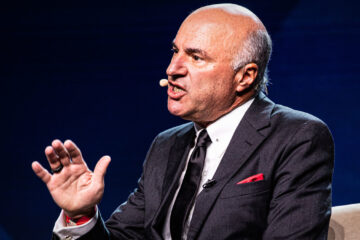The trade war with China shuttered activity between America and the Middle Kingdom. It doesn’t appear that either side is backing down, despite onerous 145% tariffs on U.S.-Chinese imports and 125% tariffs on China’s U.S. imports, likely to hit both economies hard.
In the U.S., concern has mounted that President Trump’s tariff plan will spark inflation and crimp corporate profits, causing consumers and businesses to curb spending.
The potential economic risks from the trade war are increasing bets that the U.S. is heading headlong into stagflation, or worse, a recession.
Related: Billionaire fund manager sends blunt message on S&P 500 bear market risk
Avoiding that outcome may depend heavily on how trade deals play out. If China remains in the penalty box, then it becomes critical to reach deals quickly with other trading partners.
The point isn’t lost on Treasury Secretary Scott Bessent, a Wall Street veteran trained under the legendary hedge-fund manager Stanley Druckenmiller. Bessent went on to run his hedge fund, Key Square Group, before Trump appointed him to run the Treasury in 2025.
On April 29, Bessent gave a trade update at a White House press conference, commenting on negotiations, the economy, and potential new policies, including tax relief and deregulation.
U.S. Treasury Secretary Scott Bessent recently offered an update on trade deals at a White House press conference.
Image source: Bloomberg/Getty Images
The US economy is on the brink
The health of the U.S. economy depends heavily on consumer and business sentiment. When people and companies are optimistic, they’re willing to open their wallets. However, when pessimism reigns, they hit the brakes on spending, causing economic activity to plummet and unemployment to increase.
Unfortunately, uncertainty over how tariffs will play out has hammered confidence, suggesting the U.S. economy could face a reckoning.
The University of Michigan’s Consumer Sentiment Survey results tumbled 8% to 52.2 in April from March, the fourth-worst level in April since 1952. Inflation expectations for the year ahead surged to 6.5% from 5% last month — the highest forecast since 1981.
The Conference Board’s survey shows similar worry. Its closely watched expectations index, which reflects consumers’ short-term outlook, fell 12.5 points to 54.4 in April, the worst showing since October 2011. Historically, readings below 80 have suggested a recession is coming.
There’s good reason for consumers to be leery.
Tariffs risk kindling inflation as businesses look to pass along import taxes. That’s problematic because CPI inflation of 2.4% last month is still above the Fed’s 2% target, and has already dented consumer spending, forcing shifts to essentials from discretionary purchases.
Cracks are emerging in the job market, too. Unemployment has increased to 4.2% from a low of 3.4% in 2023, and there are fewer jobs for job seekers. The Job Openings and Labor Turnover Survey shows 7.2 million unfilled jobs in March, down 901,000 from one year ago.
More Experts:
Legendary fund manager sends blunt 9-word message on stock market tumbleBillionaire Michael Bloomberg sends hard-nosed message on economyRare event may send S&P 500 soaring
The Bureau of Labor Statistics reports its latest monthly unemployment data on May 2. The U.S. economy is expected to have created 130,000 jobs, but Torsten Slok, the popular chief economist at influential hedge fund Apollo Global, with $512 billion in assets under management, isn’t convinced.
“Some leading indicators suggest we could see a dramatic weakening in the labor market over the coming months,” wrote Slok in a recent update. “The consensus expects 130K jobs created in April. There are significant risks the number is going to be lower, perhaps even negative.”
Scott Bessent delivers trade war update
The uncertainty has sparked significant market volatility, including a roller-coaster ride on Wall Street, and a sell-off in Treasury bonds and the U.S. Dollar.
Jittery markets increase the risk to the economy, given that businesses rely on them for financing, and people consider portfolio values when deciding on major purchases.
To boost confidence, Treasury Secretary Bessent addressed a White House press conference on April 29, saying progress is being made with some trading partners.
“I could see some announcements on India. I can see the contours of a deal with the Republic of Korea coming together. And then, we’ve had substantial talks with the Japanese,” said Bessent. “We are very close on India… India negotiations are going well.”
As for China, Bessent says it’s in their best interest to make a deal, but he didn’t seem overly optimistic that any agreement is near.
“Chinese tariffs are unsustainable for China. If these numbers stay on, China could lose 10 million jobs very quickly,” said Bessent. “We are the deficit country. They sell almost five times more goods to us than we sell to them, so the onus will be on them to take off these tariffs. They are unsustainable for them.”
Related: Veteran fund manager resets stock market forecast after oversold rally
When asked if talks with China are ongoing, something China has publicly disputed, he said, “They have a different form of government. I’m not going to get into the nitty gritty of who’s talking to whom.”
When pressed on whether Trump is talking to China, he said he has many jobs, but “running the switchboard isn’t one of them.”
Bessent also acknowledged uncertainty being a big problem, but suggested it’s a negotiating tactic that should eventually fix itself.
“President Trump creates strategic uncertainty,” said Bessent. “He is more concerned with getting the best possible trade deals for the American people… The aperture of uncertainty will be narrowing… as we start moving forward announcing deals, then there will be certainty.”
Bessent doesn’t think tariff agreements are the only reason Americans and businesses should be more optimistic. He also sees policy changes and tax reform as key. The Trump administration is pushing to eliminate taxes on tips, Social Security, and overtime, and provide business tax breaks on equipment and factories.
“Since January 20, interest rates, mortgage rates are down, gasoline and energy prices are down. We’re expecting further decreases,” said Bessent. “The big tax on consumers that goes unnoticed is regulation and we are deregulating. We would expect real purchasing increases…Peace deals, trade deals, tax deals, and deregulating… I think by the third and fourth quarter that’s really going to kick in.”
Related: Veteran fund manager unveils eye-popping S&P 500 forecast


